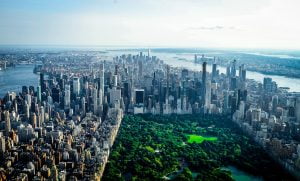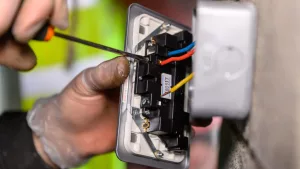NYC Noise Ordinance & Quiet Hours (2025)
Go Back To Previous Page reduce distracting and bothersome sounds that can disturb people while they work or sleep. It also establishes specific noise regulations for residential areas and designates quiet hours throughout the city to improve the quality of life.
reduce distracting and bothersome sounds that can disturb people while they work or sleep. It also establishes specific noise regulations for residential areas and designates quiet hours throughout the city to improve the quality of life.Understanding Noise Laws in New York
New York City has specific noise regulations designed to protect residents from excessive disturbances. The New York City Noise Code, for instance, establishes acceptable noise levels for different times of the day.
It’s important for both landlords and tenants to understand these regulations. Noise that exceeds the permitted levels can result in fines, legal action, or other penalties. Landlords are responsible for ensuring that their properties comply with these local laws, while tenants have the right to enjoy a peaceful living environment.
Tenants’ Rights Regarding Noise Complaints
Tenants in New York have the right to live in an environment that is reasonably free from excessive noise. If a tenant is disturbed by noise, the first step is usually to address the issue directly with the neighbor or tenant causing the disturbance. If the problem continues, tenants can escalate the matter to their landlord.
Under New York law, landlords are required to take reasonable steps to address legitimate noise complaints and ensure that all tenants enjoy a peaceful living environment. If a landlord fails to take action, tenants may have the option to withhold rent or file a complaint with city authorities.
At Kohan Law Group, we help tenants understand their rights and take the necessary steps to resolve noise issues, whether through negotiation or legal action.
Quiet Hours in NYC
By local noise ordinance laws, the quiet hours in New York City are from 10 p.m. to 7 a.m. Failing to comply with these regulations from 10 p.m. to 7 a.m. can lead to significant fines.
The New York City noise code also outlines specific guidelines for various types of noise. Here is a helpful guide to understanding NYC’s quiet hours.
NYC Construction Noise
Construction is a significant source of noise pollution.
To help reduce these unwanted loud noises, construction activities are limited on weekdays from 7 a.m. to 6 p.m. Only specific types of construction are permitted 10 a.m. 10 a.m. and 4 p.m. The activities must be at least 300 feet away from places of worship.
Any construction outside these designated hours requires approval from the Department of Buildings and Transportation. Additionally, developers must create a noise mitigation plan before commencing any work.
Animal Noise: barking dog
Pets significantly contribute to noise pollution.
According to the NYC noise ordinance, pet owners must make an effort to minimize noise from their animals, particularly during designated quiet hours.
While a single bark may not warrant a complaint, residents have the right to contact law enforcement if the noise from an animal continues for more than ten consecutive minutes during the day, 7 a.m. to 10 p.m.
Food vending vehicles are a key part of New York City culture, but they can also contribute to noise pollution. Many of these vehicles play jingles to attract customers. While allowed when the vehicle is in motion, trucks are prohibited from playing jingles while the vehicle is stationary.
This rule prevents ongoing noise from disturbing nearby workers and residents.
Air Conditioners & Circulation Devices
Air conditioners are another contributor to noise pollution, especially in older units. While the use of AC is permitted during quiet hours, residents have a responsibility to ensure the unit doesn’t make too much noise.
A single AC or another circulating unit must not exceed a volume of more than 42 decibels. Buildings with multiple devices must not exceed a volume of more than 45 decibels.
Loud Music from Bars & Restaurants
Live music plays a significant role in the popularity of nightlife in New York City. However, venues must be mindful of the noise disturbances they may cause to nearby residents.
According to the NYC Noise Code, the sound level from commercial venues should not exceed 42 decibels when measured inside a nearby residence.
Additionally, during quiet hours, the sound must not exceed 7 decibels above the ambient noise level when measured in a nearby street or public area within 15 feet of the source. Furthermore, bass sounds must not exceed 6 decibels above the ambient sound level to prevent physical discomfort for nearby residents due to the resonance of the sound.
Refuse Collection Vehicles
Refuse collection is crucial for maintaining clean streets and keeping them free from debris. However, it can also generate significant noise.
During regular collection hours, the maximum sound level from a refuse vehicle must not exceed 80 dB when measured from a distance of 35 feet or more. Additionally, between the hours of 11 p.m. and 7 a.m., these vehicles do not exceed 80 dB when measured within 50 feet of a residential property.
Motor Vehicles & Motorcycles
New York City is notorious for its traffic congestion, particularly in Manhattan. However, drivers must minimize noise levels to avoid disturbing residents. The city’s Noise Code restricts excessive noise from vehicle mufflers or exhaust systems in areas where the speed limit is 35 mph or lower.
Excessive noise means it is audible from 150 feet away for cars and 200 feet away for trucks and motorcycles. Additionally, the noise code prohibits the use of horns except for warning others of potential danger.
When and Where to File a Noise Complaint in NYC
Violating any regulation outlined in the noise code is illegal and can result in a fine ranging from $150 to $400, depending on the severity of the violation. If you are a resident who has been disturbed or disrupted by a noise code violation, you have the right to file a complaint.
If the noise you hear may be connected to a potential crime—such as fighting, shouting, gunshots, explosions, large crowds that could be dangerous, or suspicious sounds like breaking glass or wood—you should call 911. For less severe but still disruptive noise, you can contact 311 or file a noise complaint online.
To file a complaint online, visit www1.nyc.gov and select “Noise” from the homepage. There, you can choose the type of disturbance and follow the instructions to submit your complaint. Alternatively, you can call 311, and they will direct your complaint to the appropriate agency.


